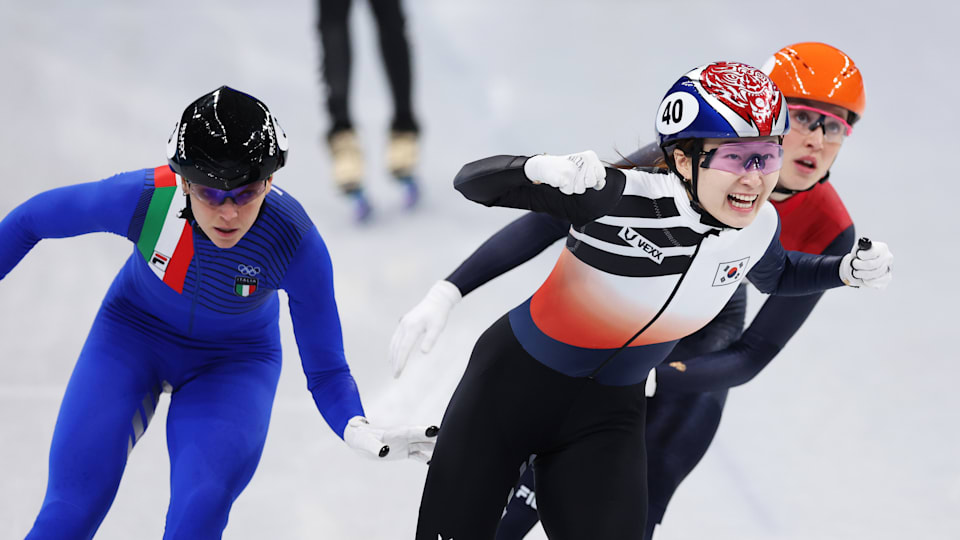Choi Min-jeong: "Enjoy every moment of Gangwon 2024"
Three-time short track speed skating Olympic champion from the Republic of Korea speaks to Olympics.com about her role as an ambassador for Gangwon 2024, and looks back at Beijing 2022.

Three-time Olympic champion Choi Min-jeong is a dominant force in short track speed skating, having collected more than 30 gold medals across the competitions she has participated in for the past eight years.
Whilst Choi is renowned for her explosive acceleration and enormous stamina, it is difficult to imagine that the Republic of Korea skater has managed to achieve the feat without developing the mental side of her game.
Though she seldom expresses her emotions on and off the rink, the 24-year-old could not hide her smile as she reminisced about the arena where she claimed two Olympic gold medals five years ago at PyeongChang 2018 – which will be re-used next winter at the Gangwon 2024 Winter Youth Olympic Games.
Appointed as an ambassador for Gangwon 2024 with 300 days left to the Opening Ceremony, the 24-year-old remained as humble as usual when she spoke exclusively to Olympics.com.
This interview has been translated from Korean and edited for clarity.
Choi Min-jeong Q&A
Olympics.com (OC): Although you haven’t taken part in the Youth Olympic Games (YOG), what do you expect young athletes to experience in the place where you became an Olympic champion for the first time at PyeongChang 2018?
Choi Min-jeong: The most important thing is for the athletes take the YOG as a festival, where they can enjoy the atmosphere as much as possible.
OC: You are a role model for many short track speed skaters as well as young athletes. What do you think of your role as the ambassador for the Winter Youth Olympic Games?
Choi: I think that my role is to encourage them to have fun, and to help them realise what fair play is in the competition.
OC: Athletes tend to feel more pressure in the Olympic Games than the other competitions they participate in. What would you like to say to young players in terms of overcoming such pressure on the big stage?
Choi: I’ve been to a couple of Olympics and my advice for young athletes is: Believe in what you have prepared for and carry on as you’ve done, and then you’ll be able to get over the pressure and perform well.
OC: At Beijing 2022, you were upset after the 1,000m but then you won your second title in the 1,500m. What was the secret to bouncing back so quickly? Were there any mental techniques that you used?
Choi: I believed in [what I mentioned before] and did my best, and I think it was the key to achieving good results in the end.
OC: Do you have any habits or routine in the build-up to the races, in order to deal with anxieties or stress?
Choi: I feel a lot of pressure before races, so I tend to take a deep breath and say some positive messages to myself to ease the pressure.
OC: You have world records, are a three-time Olympic champ and four-time world champ at such a young age... what motivates you to keep winning medals and how do you ensure that you never lose focus?
Choi: Well, all those good results would not have been possible without the support from those who are always around me. And I’ve always felt that there was room for improvement while I’m training or competing, so I’ve tried to make up for it with my efforts to achieve good results.
OC: What is the most important piece of advice you would have given your younger self, when you were the same age as the Youth Olympians in Gangwon?
Choi: Now that I think about it, my seniors have always told me to enjoy the moment. I didn’t understand what that meant when I was young, but as I’m asked about it now, I can tell them: Enjoy every moment - the competition itself, regardless of the result.
OC: In recent years, Republic of Korea’s short track speed skating team have not been as dominant as they used to be in the past. What do you think they need to raise their games and improve in the future?
Choi: I think the competition has intensified since the rest of the world began to raise their game. If we’re to overcome the challenge and improve in the future, we need to make some changes and set our sights higher.
